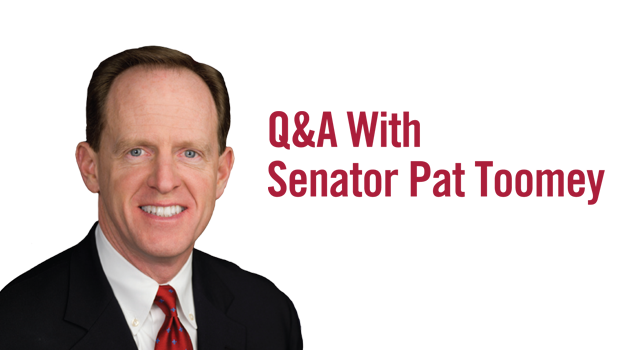There has been much discussion about the U.S. trillion-dollar annual fiscal deficits and federal debt of $16 trillion, headed for $20 trillion in three years. In your opinion, does the United States have a spending problem or a revenue problem?
The problem has always been spending. Since 2000, spending by the federal government has more than doubled. As recently as 2007, with the Bush tax cuts in place for all Americans, we ran a deficit of only 1.2 percent of GDP. It is true the recent recession caused a drop in revenue. However, even before the fiscal cliff deal, revenue was on track to return to its historical average of 18 percent of GDP by the middle of the decade. Spending, in contrast, reached a post-World War II high of one-quarter of our entire economy in 2009, and is expected to remain well above average indefinitely. Moreover, each of our major entitlement programs is growing at a rate that exceeds economic growth. As a matter of basic math, it is simply not possible to solve our debt crisis unless we get spending under control.
There have been many pieces of legislation that have passed the House, but have stalled in the Senate. How can Congress work to overcome these roadblocks?
The Senate is a deliberative body that functions better when minority rights are respected. To me, that means both sides have an equal opportunity to offer their amendments. Throughout my time in Senate, I have often been unable to get votes on my amendments to important legislation. The majority leader has used tactics that block all avenues to change a bill and thus a sufficient number of senators are unable to support the bill. As a result, legislative progress in the Senate has slowed to a halt. A bipartisan commitment to return to what is called regular order — a system that protects the rights of the minority to try to alter the bill and allows for robust debate — would permit the Senate to process more legislation.
Many of our member companies are concerned about the increased cost of health care and compliance requirements associated with the Patient Protection and Affordable Care Act. How concerned should they be about this new health-care law?
The concerns that many employers have expressed over the anticipated full implementation of the president’s health law in 2014 are very real. In less than 12 months, large employers will be required to pay penalties of up to $3,000 per employee if they fail to provide qualified health coverage of a “minimum value” and if any employee receives a taxpayer subsidy to purchase health care in the exchange. Furthermore, new taxes on health insurance and medical devices are driving up the cost of health care. For example, the Joint Committee on Taxation anticipates that the new health insurance premium tax will increase average family premiums by $400 in 2016. For a company of 25, that translates into an additional $10,000 just to cover the health insurance premium tax.
Many companies are reluctant to expand primarily due to the regulatory uncertainties in Washington, D.C. What can be done to address this problem?
This is something I hear about everyday across Pennsylvania. From steel mill operators to farmers and just about everyone in between, they constantly tell me that Washington is getting in the way. I think two specific things can be done. First, I am a big fan of the REINS Act. That is short for the Regulations from the Executive in Need of Scrutiny Act and it would force Congress to vote on every major regulation proposed by Washington bureaucrats. Two, we should use congress’ power of the purse to defund the ability of agencies to promulgate burdensome regulations.
As you reflect on your last two years in office, what do you consider to be your biggest accomplishment and why?
It is critical that we remove government-imposed hurdles that prevent businesses from growing and hiring new employees. I authored a series of bills that became the basis for the Jumpstart Our Business Startups or JOBS Act. The JOBS Act cuts regulatory burdens on small and medium-sized businesses and makes it easier to raise much-needed capital through public offerings, helping companies to expand, hire new workers, and create thousands of new jobs. The Senate passed the bill in a bipartisan fashion in March and the president signed it in April. It’s now the law of the land. Legislation like the JOBS Act removes unnecessary government obstacles to allow the private sector to thrive, and I am proud to have worked with members on both sides of the aisle to craft this law.















